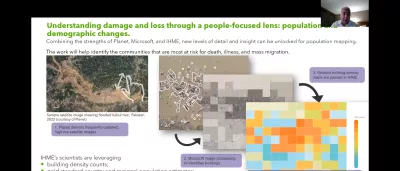IHME’s Professor Ali H. Mokdad began his career at the US Centers for Disease Control and Prevention (CDC). This fall, he returned to his roots, giving a presentation about IHME’s work to fellows through the CDC Global Public Health Systems Branch.
In total, 420 people from 92 countries attended the presentation, which was held via Zoom. The audience consisted of fellows who work for ministries of health worldwide. These fellows were participating in the Field Epidemiology Training Program (FETP), which is modeled on the Epidemic Intelligence Program at the CDC. The FETP trains health professionals to identify, investigate, and address public health emergencies. In 1980, the CDC began supporting the development of this program around the world.
In his presentation, Professor Mokdad shared information about IHME’s research, ranging from identifying the biggest drivers of premature death and ill health worldwide – the Global Burden of Disease Study – to pinpointing the health issues that account for the most health spending in the United States – the US Disease Expenditure study.
I asked Professor Mokdad to tell me more about his presentation as well as his passion for training people.
I want to look back at my career and see someone on CNN that I trained and smile knowing that I contributed to their success.
IHME: Given that you began your career in global health at the CDC, how did it feel to be presenting to fellows from around the world who are honing their skills in epidemiology?
Professor Ali H. Mokdad: I really enjoyed it and talked to folks from all over. There were people from Somalia, Sudan, Kenya, Pakistan, Afghanistan, etc. To see FETP expanding and flourishing was good. To interact with folks working on non-communicable diseases was impressive, since when FETP started it was only infectious diseases. The crowd was non-communicable disease folks.
IHME: You’re a very busy person. What motivates you to carve time out of your schedule to do these trainings?
Professor Ali H. Mokdad: I love to interact with people. The feedback is what we [at IHME] need to improve our products and make [them] more relevant to decision-makers. Training is our core value. I feel at my career stage that this part is the most rewarding. Do I need another [research] grant or to be featured on CNN or the front page of The New York Times? Is that how I want to be remembered? No. I want to look back at my career and see someone on CNN that I trained and smile knowing that I contributed to their success. I need to spend time now to prepare the next [IHME director] Chris Murray, Ali Mokdad, etc.
IHME: You’ve had amazing success in your decades-long career. There are many people who admire you and want to follow in your footsteps. What’s the most important piece of advice that you would give to someone who is just starting their career in public health?
Professor Ali H. Mokdad: Be yourself and listen to others. Be humble and respectful. This will open doors for you and make this world much better for all of us. Work hard, of course.
